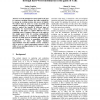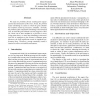1151 search results - page 82 / 231 » The role of game theory in human computation systems |
ATAL
2008
Springer
13 years 10 months ago
2008
Springer
Coalitional games raise a number of important questions from the point of view of computer science, key among them being how to represent such games compactly, and how to efficien...
ATAL
2006
Springer
13 years 11 months ago
2006
Springer
Conventional information fusion architectures are challenged by developments in sensor networks that allow individually-owned (and thereby selfish) sensors to interact and share d...
CIG
2005
IEEE
14 years 1 months ago
2005
IEEE
Several attempts have been made in the past to construct encoding schemes that allow modularity to emerge in evolving systems, but success is limited. We believe that in order to c...
SIGECOM
2005
ACM
14 years 1 months ago
2005
ACM
We present a new approach to representing coalitional games based on rules that describe the marginal contributions of the agents. This representation scheme captures characterist...
CCGRID
2007
IEEE
14 years 2 months ago
2007
IEEE
We study two problems directly resulting from organizational decentralization of the Grid. Firstly, the problem of fair scheduling in systems in which the grid scheduler has compl...


